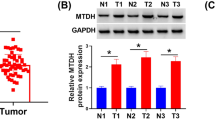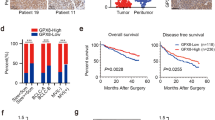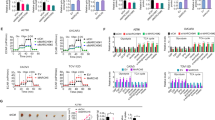Abstract
Non-small cell lung cancer (NSCLC) is the most common subtype of lung cancer with poor prognosis. This study designated to figure out the effects of Ubiquitin Specific Peptidase 36 (USP36) on NSCLC. Data of this study demonstrated that upregulation of USP36 was observed in NSCLC tissues and cell lines. Overexpression of USP36 promoted NSCLC cell proliferation and inhibited NSCLC cell apoptosis. Knockdown of USP36 decreased Ketohexokinase A (KHK-A) and increased KHK-C expression at both RNA and protein levels. Expression of c-MYC and hnRNPH1/H2 was positively correlated with the expression of USP36. Upregulation of c-MYC reversed the downregulation of hnRNPH1/H2 induced inhibition of USP36. Overexpression of hnRNPH1/H2 reversed the downregulation of KHK-A induced inhibition of USP36. Results of in vivo xenograft model were consistent with the findings of in vitro experiments. In summary, overexpression of USP36 in NSCLC accelerated tumor growth through upregulation of KHK-A, which was medicated by stabilizing c-MYC to increase hnRNPH1/H2 expression.






Similar content being viewed by others
Availability of data and material
All data generated or analyzed during this study are included in this published article.
References
P Goldstraw 2011 Non-small-cell lung cancer Lancet 378 9804 1727 1740
R Ruiz-Cordero WP Devine 2020 Targeted therapy and checkpoint immunotherapy in lung cancer Surg Pathol Clin 13 1 17 33
K Sankar SM Gadgeel A Qin 2020 Molecular therapeutic targets in non-small cell lung cancer Expert Rev Anticancer Ther 20 8 647 661
RS Herbst D Morgensztern C Boshoff 2018 The biology and management of non-small cell lung cancer Nature 553 7689 446 454
N Krause A Wegner 2020 Fructose metabolism in cancer Cells 9 12 2635
Z Lu T Hunter 2018 Metabolic kinases moonlighting as protein kinases Trends Biochem Sci 43 4 301 310
T Ishimoto 2012 Opposing effects of fructokinase C and A isoforms on fructose-induced metabolic syndrome in mice Proc Natl Acad Sci USA 109 11 4320 4325
H Jiang 2021 Fructose and fructose kinase in cancer and other pathologies J Genet Genom 48 531
X Li 2016 A splicing switch from ketohexokinase-C to ketohexokinase-A drives hepatocellular carcinoma formation Nat Cell Biol 18 5 561 571
CV Dang 2012 MYC on the path to cancer Cell 149 1 22 35
XX Sun RC Sears MS Dai 2015 Deubiquitinating c-Myc: USP36 steps up in the nucleolus Cell Cycle 14 24 3786 3793
J Li 2008 Differential display identifies overexpression of the USP36 gene, encoding a deubiquitinating enzyme, in ovarian cancer Int J Med Sci 5 3 133 142
Q Liu 2019 USP36 protects proximal tubule cells from ischemic injury by stabilizing c-Myc and SOD2 Biochem Biophys Res Commun 513 2 502 508
PK Juvvuna 2021 NBAT1/CASC15-003/USP36 control MYCN expression and its downstream pathway genes in neuroblastoma Neurooncol Adv 3 1 vdab056
World Medical Association 2013 World Medical Association Declaration of Helsinki: ethical principles for medical research involving human subjects JAMA 310 20 2191 2194
National Research Council Committee for the Update of the Guide for the, C. and A 2011 The national academies collection: reports funded by national institutes of health, in guide for the care and use of laboratory animals National Academies Press Washington
N Duma R Santana-Davila JR Molina 2019 Non-small cell lung cancer: epidemiology, screening, diagnosis, and treatment Mayo Clin Proc 94 8 1623 1640
A Kuzyk S Mai 2014 c-MYC-induced genomic instability Cold Spring Harb Perspect Med 4 4 a014373
AS Farrell RC Sears 2014 MYC degradation Cold Spring Harb Perspect Med 4 3 a014365
XX Sun 2015 The nucleolar ubiquitin-specific protease USP36 deubiquitinates and stabilizes c-Myc Proc Natl Acad Sci USA 112 12 3734 3739
D Thevenon 2020 A nucleolar isoform of the drosophila ubiquitin specific protease dUSP36 regulates MYC-dependent cell growth Front Cell Dev Biol 8 506
X Li X Qian Z Lu 2016 Fructokinase A acts as a protein kinase to promote nucleotide synthesis Cell Cycle 15 20 2689 2690
J Kim 2020 Ketohexokinase-A acts as a nuclear protein kinase that mediates fructose-induced metastasis in breast cancer Nat Commun 11 1 5436
X Yang 2019 Prognostic impact of metabolism reprogramming markers acetyl-CoA Synthetase 2 phosphorylation and ketohexokinase-A expression in non-small-cell lung carcinoma Front Oncol 9 1123
R Martinez-Contreras 2007 hnRNP proteins and splicing control Adv Exp Med Biol 623 123 147
CJ David 2010 HnRNP proteins controlled by c-Myc deregulate pyruvate kinase mRNA splicing in cancer Nature 463 7279 364 368
F Yang 2018 Cancer stem cell-like population is preferentially suppressed by EGFR-TKIs in EGFR-mutated PC-9 tumor models Exp Cell Res 362 1 195 202
Acknowledgements
Not applicable.
Funding
Not applicable.
Author information
Authors and Affiliations
Contributions
QD designed the study, supervised the data collection, MW and JD analyzed the data, interpreted the data, prepare the manuscript for publication and reviewed the draft of the manuscript. All authors have read and approved the manuscript.
Corresponding authors
Ethics declarations
Conflict of interest
The authors state that there are no conflicts of interest to disclose.
Ethics approval
Ethical approval was obtained from the Medical Ethics Committee of West China Fourth Hospital of Sichuan University (Approval No. 2017087).
Informed consent
Written informed consent was obtained from a legally authorized representative(s) for anonymized patient information to be published in this article.
Additional information
Publisher's Note
Springer Nature remains neutral with regard to jurisdictional claims in published maps and institutional affiliations.
Rights and permissions
About this article
Cite this article
Deng, Q., Wu, M. & Deng, J. USP36 promotes tumor growth of non-small cell lung cancer via increasing KHK-A expression by regulating c-MYC–hnRNPH1/H2 axis. Human Cell 35, 694–704 (2022). https://doi.org/10.1007/s13577-022-00677-6
Received:
Accepted:
Published:
Issue Date:
DOI: https://doi.org/10.1007/s13577-022-00677-6




